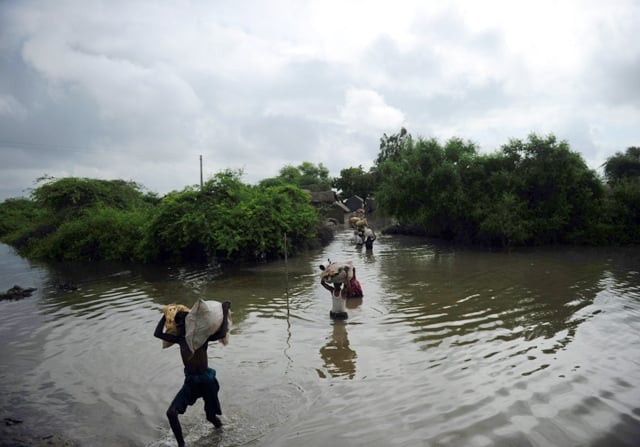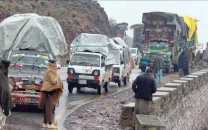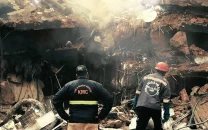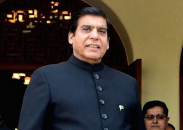Prevention cheaper than cure: Experts worry the poor suffer most in disasters
Natural hazards turn into disasters when authorities fail to cope with them, say experts.

PHOTO: AFP/FILE
Worse still, the situation for these people is not likely to improve as long as their governments turn a deaf year towards universal calls for dealing with climate change.
Environmental experts from India, Bangladesh, Sri Lanka and Nepal and members of civil society organisations joined government representatives during a two-day conference on “Disaster Response in South Asia: Exploring Commonalties and Realizing Joint Framework. The conference, organised by the Pakistan Institute of Labour Education and Research (Piler), concluded on Wednesday, with calls to set up a regional disaster management fund.
Dr Kaiser Bengali, former adviser to chief minister, observed that the poor villagers are likely to suffer disproportionately. “Bungalows of ministers have never drowned or fallen apart whenever a [natural] disaster has struck.”
Naseer Memon of the Strengthening Participatory Organisation pointed out that South Asia was a “hotspot for disasters, as almost all major rivers originate from Himalayan glaciers, which have started to melt”. Drawing attention to the fact that Pakistan has had floods in three consecutive years, Memon suggested that its government borrow a tip or two from the Japanese, who have a structure to deal with emergencies such as floods, earthquakes and tornadoes. Memon added that 75 per cent of the people in South Asia live in rural areas, and as such were most likely to be affected by natural calamities.
Irfan Mufti, deputy director of the South Asia Partnership Pakistan, criticised the National Disaster Management Authority (NDMA) for failing to make adequate safety arrangements in 2011, when the government’s own forecasts had showed that floods were likely to affect 25 million people. Mufti added that it was cheaper to make preventative arrangements than to engage in recovery and rehabilitation phases afterwards.
Hoping to get Karachiites on their guard, Sindh Minister for Rehabilitation, Haji Muzaffar Shujra, pointed out that residents of urban areas were also in danger of coming face to face with environmental disasters. Populated coastal areas such as Defence and Korangi are in danger of tsunamis and earthquakes. The city also has a nuclear facility, which puts its residents at grave risk, he added.
Everyone should chip in
Dr Raghunandan of the Delhi Science Forum, who had joined the conference through Skype, criticised developed countries for refusing to take responsibility for managing global emission levels while telling developing countries to check their own emission levels. “Countries’ contributions should be in proportion to their ability to cause damage to [global] climate.”
Charles Pradhan, who was visiting from Nepal, told the participants about various measures his country had taken to adapt to climate changes. “[Nepal] is progressing because it promotes community forestation and agriculture.”
Piler’s Karamat Ali claimed that a “nondemocratic approach” was destroying Pakistan’s natural resources. Ali also accused the government for refusing to give visas to speakers from India and Bangladesh who wished to participate in the two-day conference.
Published in The Express Tribune, January 31st, 2013.



















COMMENTS
Comments are moderated and generally will be posted if they are on-topic and not abusive.
For more information, please see our Comments FAQ